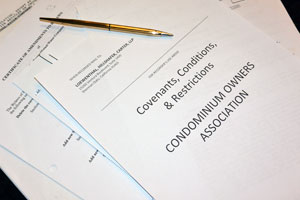2011 California Legislative Update
AB771 (Butler): Request for Documents/Fees: This law will amend Civil Code Section 1368 and add Section 1368.2. Currently, the Davis-Stirling Common Interest Development Act requires that an owner of a separate interest in a Common Interest Development provide specific documents to prospective purchasers of that property. In addition, homeowners associations are to provide those documents to the owner of the separate interest within ten (10) days of the mailing or delivery of the requests, as well as limiting the amount of fees that may be charged by the Association for providing those documents. Such fees are to be limited to the Association’s actual costs to produce, prepare and reproduce the requested documents.
AB771 will now require that the seller of a separate interest provide a copy of specified minutes of the meetings of the Association’s Board of Directors, if requested by the prospective purchaser, including 12 months of non-executive session board meeting minutes. Also, if the Association has a rental restriction in their governing documents, the owner must also include a statement identifying the restriction. In addition, the bill requires that an Association provide to the seller a written or electronic estimate of the fees to be assessed to provide the specific documents. The Association will be allowed to collect reasonable fees based upon the Association’s actual costs for procuring, preparing, reproducing and delivering the documents; however, it would preclude the charging of additional fees for electronic delivery of said documents. The Association will be allowed to contract with any person or entity to provide the documents on its behalf. Further, AB771 will require the current owner to provide a form for billing disclosures to a prospective purchaser and also require the Association to provide this form to a recipient authorized by the owner of the separate interest. It is important to note that there will not be any cap on third party provider fees. The law will also allow the owner to designate someone other than themselves to be the recipient of the documents issued by the Association. Thus, the owner/member could direct the Association to send the documents to the prospective purchaser, realtor, lender, etc.
SB150: Rental Restrictions and Requirements: One of the most discussed bills signed into law in 2011 is SB150 pertaining to rental restrictions and requirements. This law, which goes into effect on January 1, 2012, will prohibit the owner of a separate interest in a Common Interest Development from being subject to a provision in their governing documents or an amendment to the governing documents prohibiting the rental or leasing of all or any of the separate interest in that Common Interest Development to a renter, lessee, or tenant unless the governing documents/amendment was effective prior to the date the owner acquired title to his or her separate interest. SB150 does authorize that owner to expressly consent to be subject to a governing document provision/amendment with that specified prohibition.
As a result of SB150, numerous homeowners associations have rushed to attempt to amend their governing documents to add a rental restriction so that it is in effect prior to January 1, 2012, thus making it enforceable as to all owners. For those associations who do not have rental restrictions in place prior to January 1, 2012, the potential benefit of such a restriction will likely be lost since there will be now 2 classes of homeowners, i.e., those homeowners that a rental restriction will be applicable to, i.e., they purchased after the rental restriction was in place and those who it is not applicable to, i.e., those members who owned prior to the effective date of such an amendment.
SB183: Carbon Monoxide Devices: Commencing on July 1, 2011, SB183 will require all single family homes with an attached garage or a fossil fuel source to install carbon monoxide alarms within their homes. Owners of multifamily leased or rental dwellings, such as apartment buildings, hotels, motels, condominiums are also subject to this new legislation. As such, by January 1, 2013, condominiums will be required to have carbon monoxide alarms installed in each unit. Pursuant to SB183, a carbon monoxide device is to be installed outside of each sleeping area. The remedy for failing to install a carbon monoxide device is actual damages not to exceed $100, exclusive of any court costs and attorneys fees. It is our general impression that the individual owners will be responsible for installing the carbon monoxide devices in either their single family home or in their own condominium unit and that it will not be an association responsibility to so install.
SB209: Electric Vehicle Charging Stations: Another controversial bill is SB209 pertaining to electric vehicle charging stations. This bill will be codified as Civil Code Section 1353.9. SB209 will void and deem unenforceable any provision of an association’s governing documents of a Common Interest Development that effectively prohibits or restricts the installation or use of an electric vehicle charging station. The Bill will authorize an association to impose reasonable restrictions on the placement of such stations, as well as requirements with respect to an association’s approval process for same as long as the restrictions do not significantly increase the costs or reduce its efficiency. The Association must respond to an owner’s application regarding an electric vehicle charging station within sixty (60) days; otherwise, it will be deemed automatically approved . In those instances where an electric vehicle charging station is to be placed on common area or exclusive use common area, the homeowner would be responsible for the costs associated with maintaining and repairing the station, as well as the cost for any damage to the common area and adjacent units resulting from the installation and maintenance of the station. The Bill also places additional duties and responsibilities on an owner including maintaining an umbrella liability insurance policy of no less than $1,000,000 (one million dollars) that names the association as an additional insured. It should be noted that an association that violates these provisions would be liable for damages and a civil penalty not to exceed $1,000 (one thousand dollars), as well as reasonable attorney’s fees. The electric bills must be paid by the member and the member must also disclose these conditions to any purchasers.
This controversial bill has many problems including a potential issue that if the electric vehicle charging station is to be placed on common area or exclusive use common area, whether such construction would constitute a “taking” of real property since generally two-thirds vote of the membership of an association must vote in favor of granting an exclusive use common area for such installations. Though signed, issues still remain with this statute that will likely be dealt with over the ensuing months.
SB563: Notice/Meetings: SB563, which will be codified into Civil Code Section 1363.05, will likely be the new law that affects Board of Directors, managers and the overall operation of an association the most going into 2012. As we are all aware, current law sets forth requirements for meetings of the Board of Directors of the Association and requires notice of the time and place of a meeting of the Board of Directors to be given to the membership of the association at least 4 days prior to the meeting, except under very specific circumstances, i.e., an emergency meeting. SB563 will require a notice of the time and location for a meeting that will be held solely in executive session to be given to members of the association at least 2 days prior to the meeting, except for emergency meetings (1360.05(g). The executive session board meeting must have an agenda; however, we would recommend that the agenda be very general, i.e., use the language of Section 1363.05 regarding executive session, i.e., litigation, contracts, member discipline, personnel matters, member assessment payments. Executive session board agendas will now be available to a member for inspection and copying if requested. The Bill also provides that if a member consents, notice may be given to the member electronically. The Bill also deletes provisions that would generally allow the Board of Directors to consider any proper matter at a meeting even if it had not been noticed as an action item for the meeting.
This Bill is also being viewed as the end of Boards conducting business via the use of emails. Since the inception of emails, many boards have operated and made decisions without a meeting via unanimous written consent of the entire board. As has been the case over the last decade, many statutes that are now signed into law pertain to the issue of transparency with respect to the information available to the member as to the governance of the association, obtainment of documentation, books, records, etc. SB563 is a progression of these earlier transparency laws.
SB563 does not necessarily preclude Board members from limited communication via email; however, the bills’ clear intent is to prohibit decision making through the use of email meetings, with the exception of emergency meetings. Thus, it confirms that Boards may not take action outside of a duly noticed Board meeting, except as to those actions that have been delegated to the manager, officers or board committee (less than a majority of the Board).
Emails may still be used as a method of conducting an emergency meeting if all members of the Board, individually or collectively, consent in writing to that action, and if the written consent or consents were filed with the minutes of the meeting of the Board. Written consent to conduct an emergency meeting may be transmitted electronically. Interestingly, SB563 will allow meetings to be conducted by the Board via a teleconference as long as it is an open meeting and would allow owners to attend the meeting via telephone or video conference. As such, in the event that a meeting will be conducted via a teleconference, there must be a minimum of one physical location that members may go to in order to listen and participate in the meeting and at least one member of the Board of Directors must be physically present at that teleconference site. (Civil Code Section 1363.05(b)).
Violation of any of these provisions could allow a civil claim by an owner. If an owner prevails, he would be entitled to reasonable attorneys fees and costs and up to a $500 per violation penalty. An Association is not entitled to attorneys fees and costs if it prevails, unless it can show that the lawsuit was frivolous.
BILLS TO WATCH IN THE FUTURE
SB561: Delinquent Assessments: This two year bill would affect an association’s ability to collect assessments. Specifically, the law, as it currently stands, allows an association to levy regular and special assessments and, if an assessment is delinquent, authorizes the association to recover reasonable costs and attorneys fees incurred in collecting the assessment, as long as the Civil Code and governing documents are complied with. SB561, as currently contemplated, would prohibit an association from assigning or pledging the association’s rights to collect payments for assessments to a third party or to contract with a third party to collect delinquent payments or assessments unless that third party also agrees to comply with the same requirements imposed on the association. The Bill would also prohibit a third party from acting as a trustee in a foreclosure proceeding. SB561 would also require that a delinquent owners payments be credited to the homeowners association prior to the debt collector. This will obviously impact the entire collection process since associations are generally not in a position to collect the delinquent assessments and those entities that are may very will not be willing to perform such services if their fees are to be the last one paid.
AB805: Comprehensive Reorganization of the Davis-Stirling Act: As has been discussed for many years, the legislature is continuing reviewing and considering a dramatic overhaul to the Davis-Stirling Act and the recodification of the statutes governing Common Interest Developments. This Bill, if ultimately adopted, would take effect on January 1, 2014 and would re-write and revise numerous issues pertaining to Associations including the issue of notices and delivery, definitions, enforceability of governing documents and the amendments of same. The Bill would also define potential conflicts of interest among Board members that could disqualify them from voting on certain matters. The revision also contemplates modifications to elections and voting, record retention and the release of liens recorded by the association in error. Again, this Bill has not been voted into law and will likely not be reconsidered until 2013 for possible implementation in 2014.
LEGISLATION THAT WAS VETOED BY GOVERNOR BROWN
SB759: Artificial Turf: The issue of requiring homeowner associations to allow artificial turf was again debated in 2011. Currently, existing law requires local agencies to adopt specified ordinances regarding water efficient landscaping that is at least as effective as the model ordinance with respect to water conservation. SB759 would have provided that any provision of an association’s governing documents that prohibits, or includes conditions that have the effect of prohibiting, the use of artificial turf or other synthetic surfaces that resemble grass would have been void and unenforceable. The proposed legislation would have allowed an association to apply certain landscaping rules and regulations with respect to design and quality standards for the installation of artificial turf to the extent that it did not prohibit the actual use of artificial turf or other synthetic surfaces that resemble grass.
In vetoing Senate Bill 759 Governor Brown stated as follows: “Under this Bill, homeowners associations that govern Common Interest Developments would be forced to approve the installation of Astroturf. The decision about choosing synthetic turf instead of natural vegetation should be left to individual homeowners associations, not mandated by State law. For this reason, I am returning this Bill.”
STATUS OF FEDERAL HOUSING ADMINISTRATION (FHA) MORTGAGE INSURANCE
The Federal Housing Administration (FHA) recently announced plans to begin disqualifying condominium association for FHA financing if an association charges a deed based transfer at the time of sale. Generally, these fees help fund reserves and operation and are levied at the time of sale. Generally, the fees are less than $500 and are based upon the formula contained within the CC&Rs, i.e., a percentage of a sale price, fixed sum or a specific number of monthly assessments. The difficulty with the FHA position is that the deed based transfer fees are CC&R provisions and requires a vote of the membership to remove it.


